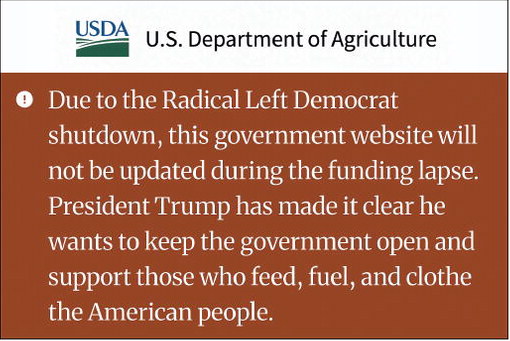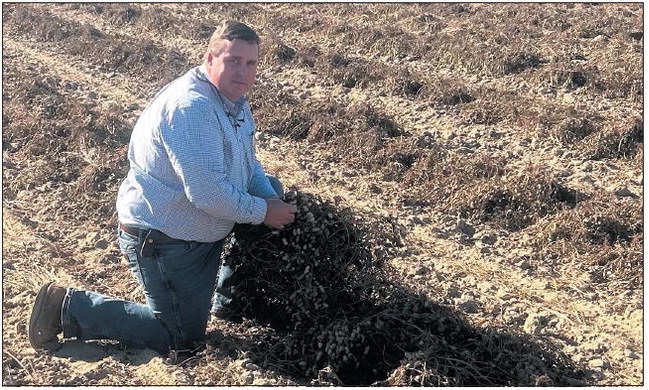Government Shutdown Halts Peanut Sales


mrandolphadvance@gmail.com
The current U.S. Government Shutdown is having detrimental effects on peanut harvesters across the state, as these farmers are unable to sell their crops at the buying point, the location that receives and grades peanuts for storing and shelling.
Toombs County Farmer Chris Hopkins is one of several farmers waiting on the government shutdown to end to receive payments for his peanut crop, as the government has shut down at the height of the harvest.
“Basically, when a farmer harvests his peanuts, they are carried to a buying point and inspected by [United States Department of Agriculture (USDA)] graders. They get a federal grade for those peanuts, and typically speaking, the way that our marketing system works with peanuts now is the peanuts are put into the federal marketing loan, and the current price per ton for the federal continued from page
marketing loan is $355 per ton,” Hopkins explained. “So, for every ton of peanuts that a farmer harvests, they will go into the federal marketing loan at $355, and then, typically speaking, a sheller – the company that buys the peanuts to shell them and then sell them to the end user [such as] Peter Pan, Jif, Smuckers – they will buy those peanuts out of the federal marketing loan. We call that ‘redeeming the loan.’ Then, they own those peanuts.”
In this process, Hopkins states that farmers are assured to receive $355 per ton when selling to shelling companies, but may also receive an option payment, which is money the shelling companies pay in addition to the federal loan payment.
He stated that though the government is shut down, the peanuts are able to be graded by the USDA because grading is considered a necessary service, but the federal loans cannot be redeemed. “Peanut growers can sell their peanuts directly to shellers, but that’s typically not how they do things because of the process that has been created,” Hopkins clarified. “Right now, the sheller cannot take possession of my peanuts, and I cannot get paid for them because they are sitting in a warehouse right now. The whole process is currently bottlenecked at the warehouse because no one can sell to their buying points.”
He continued, “The buying point that I deal with usually buys around 40,000 tons of peanuts. That’s $20 million of peanuts not paid for just at our buying point. That represents around 20,000 acres of peanuts and we have 920,000 acres in the state. When people start talking about that, people start to realize how much of an effect that has.”
Hopkins emphasized that this halt on peanut sales causes intense financial stress for farmers, as payments for equipment are usually scheduled to coincide with harvests.
He shared that even the smallest issues cannot be corrected during the shutdown, as a single typographical error in the USDA’s data system is blocking him from being able to do anything with one field of peanuts. “Each field we have has a serial number and is registered with what is growing on it,” he said. “One of my peanut fields was labeled as a cotton field – a simple typographical error. It would take two minutes to fix, but they can’t do anything with it until after the shutdown.”
Hopkins said that farmers are now in a waiting game to see when the government will resume, but are hoping that the day is approaching. “It’s all just stacking up – it’s the main harvest time for peanuts in Georgia. Peanuts are stacking up in warehouses waiting to be sold and paperwork is accumulating for shelling company workers for all the peanuts that have been graded. It’s a mess,” he stressed.
Another aspect of agriculture that is suffering from the shutdown is the distribution of the Hurricane Helene relief funding, which was announced earlier this month by Georgia Agriculture Commissioner Tyler Harper. Farmers and timber owners cannot receive any of these funds until after the shutdown ends.
Harper commented on this, saying, “The Democrat led Federal Government shutdown will be a disaster for Georgia farm families. This shutdown is stopping much-needed disaster aid payments to Georgia farmers and delaying implementation of our state’s block grant program because they want taxpayer funded healthcare for illegals,” he emphasized. “This surely is not representative of Georgia values.”

HARVESTING WITHOUT PAY – Toombs County Farmer Chris Hopkins said that he is currently harvesting his peanut crop but unable to receive the pay for these crops until the end of the government shutdown.





